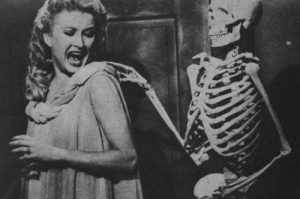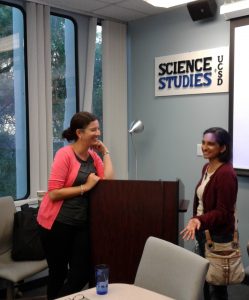Next Monday, October 17th, the colloquium is dedicated to a discussion of possible future integration of colleagues from the Department of Anthropology into the Science Studies Program, something that we have been debating for a while. The names of various anthropology faculty kept coming up as possible interested parties, and so at the beginning of term I wrote to Saiba Varma, Hanna Garth, Dredge Kang, Janis Jenkins, Katerina Semendeferi, Joe Hankins, David Pedersen, Amy Non, and Tom Csordas with this message:
“As some of you know, we are an interdisciplinary graduate program with four participating departments — history, philosophy, sociology and communications. In the last couple of years we have added a cluster of great new faculty to our ranks, some of whom wanted to know why anthropology was not part of our program. We have recently tweaked the program’s administrative structure to allow for the incorporation of different departments, and are now hoping very much to engage as many of you as possible in a discussion of whether and how we might want to strengthen our tie with anthropology.”
To my delight, most of them have accepted the invitation! So come on Monday and join in the conversation about the structure and future direction of the program. If you are unable to make it, but want to voice your opinion on this matter, please do so by posting to this website.
For anyone interested in what, exactly, the administrative tweaks are, here is the explanation I sent to the Dean of Social Sciences:
“The main change is that instead of membership of the program being channeled in a blunt way through the participation of only four departments, we would open up the possibility of membership to individual faculty all across the two divisions. The departments of Ethnic Studies, Anthropology, Literature and Visual Arts all have faculty working in the field of Science Studies. To allow these members of our community to join us fully, we will be asking departments to contribute 1.25K for each active faculty member in the program.
“One of the reasons for doing this is that philosophy’s involvement with Science Studies has been changing, and the chair and MSO have raised the question of why they contribute 5K to a program from which they do not reap much benefit in the form of student support. Since we currently have only two philosophy faculty involved with Science Studies, this new structure will halve their contribution from 5K to 2.5K. As for the integration of other departments, we are taking this slowly, but it is likely that in time for next year, Lisa Cartwright, who has moved over to Visual Arts from Communication, will be joining us as a member of that department under this new structure, allowing us to ‘road test’ the integration of a new discipline. Discussions with Anthropology, Ethnic Studies and Literature will take place over the course of the next academic year, using the colloquium as an intellectual forum.”
OK, so I was a bit over-optimistic about Visual Arts already being on board by now. It turns out that the integration of every new department has to go through a faculty vote and a grad division vote and an academic senate vote and gawd knows what else. All the more time to roll up our sleeves and have a debate about where our program and our field should be heading…


